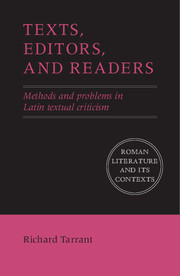Book contents
- Frontmatter
- Dedication
- Contents
- Preface
- Introduction
- 1 Textual criticism in a post-heroic age
- 2 The rhetoric of textual criticism/textual criticism as rhetoric
- 3 Establishing the text 1: recension
- 4 Establishing the text 2: conjecture
- 5 Establishing the text 3: interpolation, collaboration, and intertextuality
- 6 Textual criticism and literary criticism: the case of Propertius
- 7 Presenting the text: the critical edition and its discontents
- 8 The future: problems and prospects
- Appendix Reading a critical apparatus
- Bibliography
- General index
- Index of passages discussed
- Index of scholars
1 - Textual criticism in a post-heroic age
Published online by Cambridge University Press: 05 March 2016
- Frontmatter
- Dedication
- Contents
- Preface
- Introduction
- 1 Textual criticism in a post-heroic age
- 2 The rhetoric of textual criticism/textual criticism as rhetoric
- 3 Establishing the text 1: recension
- 4 Establishing the text 2: conjecture
- 5 Establishing the text 3: interpolation, collaboration, and intertextuality
- 6 Textual criticism and literary criticism: the case of Propertius
- 7 Presenting the text: the critical edition and its discontents
- 8 The future: problems and prospects
- Appendix Reading a critical apparatus
- Bibliography
- General index
- Index of passages discussed
- Index of scholars
Summary
In the year 1816 Karl Lachmann published at Leipzig the first scientific recension of Propertius. As for the textual criticism of his predecessors, it resembled nothing so much as the condition of mankind before the advent of Prometheus.
(Housman (1893), 102)Textual criticism today finds itself in a paradoxical situation. It is still recognized as a basic discipline within the study of Classics, or at least within that part of Classics that concerns itself with textual and literary evidence. Classical editing also continues to be a vigorous area of publication. The principal British and European series of critical texts, the Teubner, Oxford, and Budé, are all highly active, both in publishing new editions and in replacing earlier volumes. In the United States, the Loeb Classical Library has been enjoying a renaissance for the past two decades; many of the older editions have been succeeded by editions of much higher quality, and a number of new texts have been added to the series.
At the same time, however, textual criticism is becoming increasingly arcane to most professional classicists, and even many of its practitioners have lost a common sense of its aims and methods.
Explaining this situation calls for a brief historical excursus. From the mid nineteenth century to the first decades of the twentieth, textual criticism enjoyed a privileged status in classical studies, especially in Germany, which at the time was the acknowledged leader in classical scholarship. Much of the prestige of the subject was owing to the work of certain charismatic and influential critics, representatives of what I will call here the ‘heroic editor’. In the century that followed, the methods and assumptions that underpinned the authority of such figures have been called into question, which has in turn altered the standing of textual criticism and contributed to a lack of consensus among critics.
In 1858 the University of Jena was celebrating its tercentenary. Among the congratulatory messages from other universities was one from the University of Bern that contained, apart from the formulaic salutations by the Rector and Academic Senate, a disquisition on the text of Virgil by Otto Ribbeck, his Emendationes Vergilianae. It is hard to imagine a similar choice being made today, but at the time a piece of technical writing on the text of Virgil was considered an appropriate expression of the highest intellectual work being done in the university.
Information
- Type
- Chapter
- Information
- Texts, Editors, and ReadersMethods and Problems in Latin Textual Criticism, pp. 18 - 29Publisher: Cambridge University PressPrint publication year: 2016
